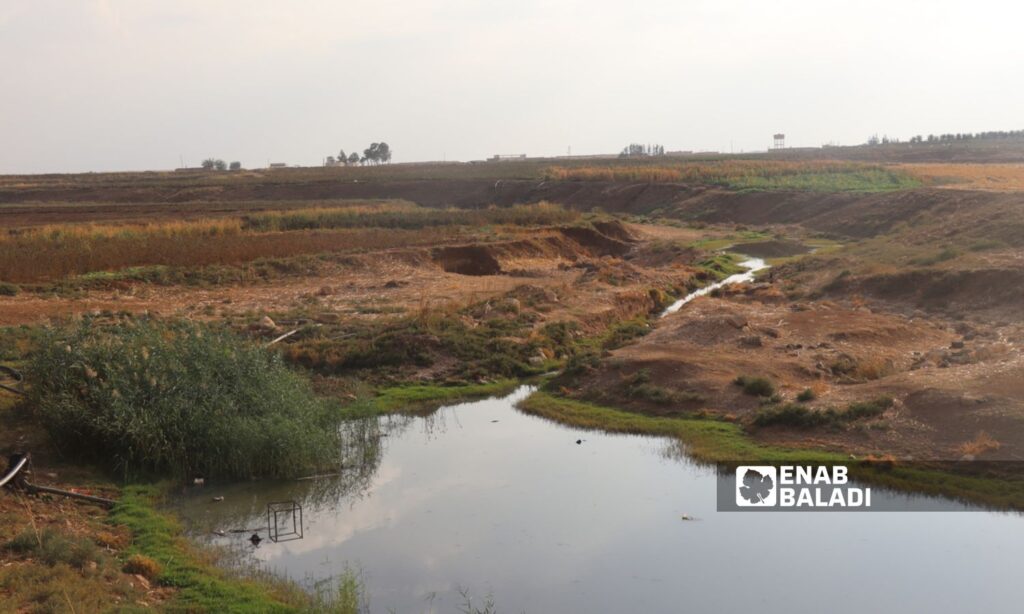Enab Baladi – Ras al-Ain
Farmers in Ras al-Ain, northwest of al-Hasakah governorate, are forced to irrigate their lands adjacent to the Turkish border with contaminated water resulting from mixing with sewage water. These lands are located in the villages of Kishto, Tel Half, and Ain al-Zarqa and are irrigated with water from the al-Khabour River that originates from the Turkish city of Ceylanpınar.
On both sides of the river, which originates from Turkey and enters Syrian territory, pumps are used to draw water from the riverbed and from the formed water basins, which is then used to irrigate the lands despite the obvious contamination and mixing with sewage water.
Furat Hussein, a farmer in the village of Kishto under the administration of Tel Half, stated that the village’s farmers rely on Turkish sewage water to irrigate their agricultural lands located on the outskirts of the al-Khabour River.
Hussein explained that sewage water used to reach the area before 2011 when the Syrian regime was in control, but they used to rely on artesian wells operated by the water establishment at that time, which made the course of the al-Khabour River clean and the water non-stagnant.
He added that the suspension of the artesian wells’ operation in Ras al-Ain and the soaring fuel prices led the farmers to use Turkish sewage water to irrigate their lands, which resulted in the contamination of agricultural crops and inflicted financial losses on them.
Odai al-Mustafa, a farmer in the village of Ain al-Zarqa, located in the city of Ras al-Ain, stated that he used to cultivate 30 acres with various crops, including parsley, green onions, and garlic.
He added that the Directorate of Agriculture in the Syrian Interim Government (SIG) issued a directive to prohibit the cultivation of vegetables on the course of the al-Khabour River due to wastewater toxicity, which compelled him to switch to cultivating forage crops such as clover and barley used for livestock.
Al-Mustafa explained that forage crops are less profitable than vegetables and food items, noting that he does not have sufficient resources to operate the artesian wells, as the cost of one well is estimated at $20,000 USD (each dollar equals 14,500 Syrian pounds).
The farmer urged the relevant authorities to reconsider the decision to prohibit the cultivation of agricultural crops and to provide support for farmers to operate the existing artesian wells on the riverbanks.
Cleaning, prohibition of cultivation, and promises
The Health Director in Ras al-Ain, Rakan al-Jaloud, informed Enab Baladi that the Health Directorate, in cooperation with the Water Directorate, conducted several rounds in the lands irrigated with sewage water, and it was found that the water had a high toxicity level, as well as the presence of insects and foul odors, posing a threat to public health, and leading to the spread of diseases and epidemics in the areas near the river.
Al-Jaloud explained that they have been in contact with the Local Council and the Directorate of Agriculture to find rapid solutions to this problem, noting that the council sprayed insecticides on the riverbanks to combat the widespread insects. They also reached out to the Turkish authorities to discuss ways to cooperate in solving this problem.
Omar Hamoud, the head of the Agriculture Office in the Local Council of Ras al-Ain, stated that the area of cultivated lands on the banks of the al-Khabour River, which are irrigated with wastewater, amounts to 1500 dunams (370 acres).
He explained that this problem is longstanding, but it has worsened due to the cessation of the artesian wells that were previously present on both sides of the river, leading the water to become stagnant and turn into polluted swamps and pools.
Hamoud added that the Directorate of Agriculture issued a directive prohibiting the cultivation of winter vegetables on the riverbanks and requesting the cultivation of only forage crops. Additionally, the river was cleaned several times, and the directorate communicated with the Turkish authorities, who, in turn, cleaned the river from the Turkish side.
He pointed out that the effective solution to this problem requires the activation of artesian wells or the construction of a sewage water treatment plant, but the resources are not available to the Local Council.
Irrigating agricultural crops with sewage water poses several risks, and the World Health Organization (WHO) has warned of its consequences, as it could lead to the spread of diseases such as diarrhea, food poisoning, and skin infections and could also lead to the contamination of soil and groundwater, causing harm to the environment.
The problems affecting the agriculture sector in Ras al-Ain continue, which, alongside livestock farming, is considered one of the main professions for the majority of the population, constituting a major source of income for the residents.

